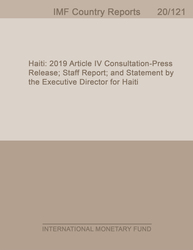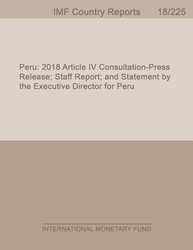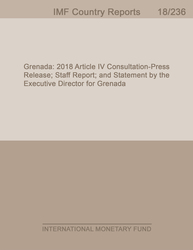
Haiti:2019 Article IV Consultation-Press Release; Staff Report; and Statement by the Executive Director for Haiti
2019 Article IV Consultation-Press Release; Staff Report; and Statement by the Executive Director for Haiti
READ MORE...
Volume/Issue:
Volume 2020
Issue 121
Publication date: April 2020
ISBN: 9781513541464
$18.00
Add to Cart by clicking price of the language and format you'd like to purchase
Available Languages and Formats
| English |
Prices in red indicate formats that are not yet available but are forthcoming.
Topics covered in this book
This title contains information about the following subjects.
Click on a subject if you would like to see other titles with the same subjects.
Banks and Banking , Exports and Imports , Money and Monetary Policy , Public Finance , Industries - Energy , Natural Disasters , ISCR , CR , staff appraisal , Moïse , deterioration in food security , U , S , dollar , article IV discussion , food assistance , anti-corruption policy priority , Energy sector , Natural disasters , Arrears , South America , Central America , Caribbean , Global
Also of interest
Summary
This 2019 Article IV Consultation discusses that driven by popular frustration with high levels of corruption and inequality, Haiti has been experiencing a protracted political crisis and prolonged civil unrest. The baseline scenario assumes some stabilization in the political situation by early 2020 but no major political or economic reforms. This would allow growth to recover only gradually and in the absence of sustained implementation of good policies and structural reforms, potential growth would remain low at about 1.4 percent over the medium term. Downside risks, both domestic and external, remain elevated. A prolongation of political instability, extreme natural disaster, drop in remittances, and/or a contraction in exports because of trade tensions would worsen the outlook, particularly given the absence of buffers and fragile social conditions. The challenge is to stabilize the macroeconomic situation in an unstable political context. The IMF Staff encourages the authorities to continue their efforts to contain the fiscal deficit and its monetary financing by the central bank. Improving domestic revenue collection and redirecting current spending would help create space for much needed social and capital expenditures. Together with steps to strengthen the central bank’s autonomy and legal framework, this would help reduce fiscal dominance.
Copyright © 2010 - 2026
Powered by:
AIDC



